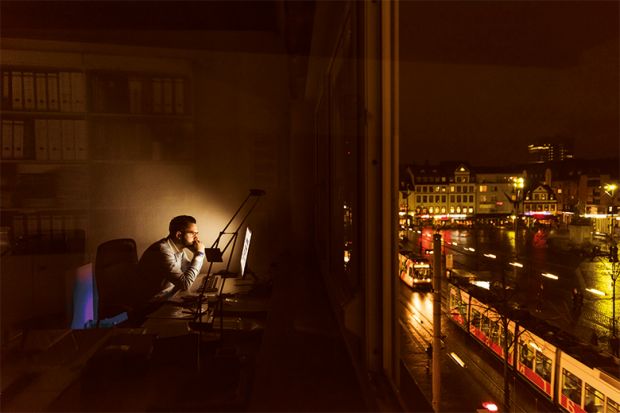I meant my tweet to hit a raw nerve, and it certainly succeeded. After some Twitter users objected that it was damaging for someone in my position to confess that what worried me more than my work-life balance was having “enough time to discover stuff”, I responded: “I think it is more damaging to suggest it’s possible that anyone can do world class science in 38 hrs per week.”
Many interpretations of my remark were discussed. Was I suggesting that postdocs and students should work more? What does world-class science look like anyway? At one point, there seemed to be more interpretations than people commenting, and it became clear that my tweet had acted as a lens through which everyone could comment on their own situation and take offence.
The tweet was written from my point of view as an academic group leader reflecting on how other group leaders cope with the high expectations imposed on them by both managers and themselves, at the same time as academic society is telling them they can have it all in terms of meeting those expectations while maintaining a busy life beyond science.
UK universities are well-oiled machines, adept at maximising measured outputs. Yet it isn’t easy for individuals to be brilliant at teaching, research and supervision all at the same time – not to mention winning research grants, supervising students, promoting diversity and engaging with the public and industry. Keeping all these plates spinning requires focus, support and luck.
The reality is that the average academic who teaches and also directs a medium-sized research team does have to routinely spend more than 38 hours a week working. In my own case, I have a very supportive university and have been able to build a large, multidisciplinary research group. This reflects my ability to obtain funding – which, I’d argue, also draws from my team’s research vision, ambition and endless ideas, generated in an open and collaborative environment.
We are attempting to build artificial life forms, digitise chemistry, make chemical computers and understand how the universe came to use chemistry to process information in the first place. These are large scientific problems that are not simple or well defined, but I’m excited that we have the infrastructure, talent, support and funding to explore them. And I don’t mind that these commitments require me to put in extra work.
Some people have suggested that large teams are not productive and force people to work longer in a type of sausage factory. This argument, constructed using anecdotal evidence, is not proven. Personally, I’d posit that small teams can also be sweatshops and sausage factories. And bullying, sadly, can take many forms beyond the expectation of long work hours.
But, in my tweet, I was absolutely not suggesting that individual research team members needed to work more than 38 hours a week to do good research. In fact, it is clear that a well-focused researcher can be extremely creative and productive in that time. And if people find that hard, we must do more to enable them to be effective.
Equally, we should allow researchers to set their own timetables as far as possible, consonant with their abilities and level of ambition. If people want to extend themselves, tipping their work-life balance more towards work, there should be nothing to inhibit them. Are we proposing to keep people out of the lab after 6pm to look after their mental and physical health or because we are jealous of what they might achieve by working late? Should we stop a concert pianist practising after 4pm, or take the paints away from an artist at the weekend? Of course not. People should be allowed to choose.
Having some core working hours is important: they encourage a good routine for students, ensure communication within the team and help us identify team members who need help with technical, motivational or mental health problems. But in my own laboratory, those hours are restricted to 10am to 4pm, Monday to Friday. We recognise that one size does not fit all; dynamic load balancing and proper mentorship and training are the key.
Nonetheless, it is worth reminding ourselves that while academic research is highly collaborative, it is also very competitive. There is a global race. So while we should aim to promote flexibility over work-life balance and enable individuals to chase their dreams and ambitions, we also need to be more honest about what is achievable in a fixed amount of time and with the resources at hand. This transparency will make people happier and more productive.
By demonising those who work long hours, we risk failing to appreciate the effort required to achieve all that they achieve, and we risk pushing them underground. This will only reinforce the false perception we can all achieve what we want without compromise.
What are you doing this weekend? I’m going to relax and have fun writing a new algorithm to search chemical space, and perhaps use this idea in a new grant proposal I’m starting to think about. But you can do whatever you like.
Lee Cronin is Regius professor of chemistry at the University of Glasgow.
POSTSCRIPT:
Print headline: Feel free to put a shift in: working long hours should not be demonised
Register to continue
Why register?
- Registration is free and only takes a moment
- Once registered, you can read 3 articles a month
- Sign up for our newsletter
Subscribe
Or subscribe for unlimited access to:
- Unlimited access to news, views, insights & reviews
- Digital editions
- Digital access to THE’s university and college rankings analysis
Already registered or a current subscriber? Login










